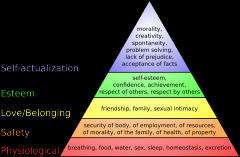![]()
![]()
![]()
Use LEFT and RIGHT arrow keys to navigate between flashcards;
Use UP and DOWN arrow keys to flip the card;
H to show hint;
A reads text to speech;
15 Cards in this Set
- Front
- Back
|
Developmental Theory |
- Describes change over time and those changes that are attributed more to maturation than to environmental experience |
|
|
Classification of Theory |
1. Nature vs. Nurture
2. Qualitative vs. Quantitative - Qualitative -> individuals are qualitatively diff. at diff. points in their life - Quantitative -> development is primarily the acquisition of a number of skills
3. Stability vs. Instability - Stability -> the rules for anticipating behavior are consistent across the lifespan - Instability -> Rules apply at different points in an ind. life
4. Reductionist vs. Nonreductionist - Reductionist -> behavior is the sum of a # of smaller behavior links - Nonreductionist -> behavior as a total cannot be broken into component parts
5. Organismic vs. Mechanistic - Organismic -> needs and goals of ind. should be considered - Mechanistic -> ind. is viewed like a machine that is acted upon by the env. |
|
|
Affective Domain Theorists |
1. Freud
2. Erikson
3. Maslow
4. Ainsworth
5. Chess & Thompson |
|
|
Sigmund Freud |
- Father of psychoanalysis - Mental processes defined by ego (basic needs), ego (persona), and superego (moral self) - Sexualized components to theories - Oedipus complex - Child Development theory: 1. Oral (Birth - 1yr) - Concerned with feeding and oral exploration
2. Anal (1-2 yr) - Bowel/bladder control
3. Phallic (3-5 yr) - Sexual exploration/Masturbation - Recognition of sexual differences in genders
4. Latency (7-12 yr) - Sexuality quiets down
5. Genital (10 yr - Adolescence) - Awakening of sexuality |
|
|
Erik Erikson |
- Neo-Freudian - Saw development in more of a psychosocial light, than biological (like Freud) - Theory is one of few that covers the entire lifespan:
1. Trust vs. Mistrust (0-1yr)
2. Autonomy vs. Shame & Doubt (1-2yr)
3. Initiative vs. Guilt (3-5yr)
4. Industry vs. Inferiority (6-12yr)
5. Identity vs. Identity Diffusion (Adolescence)
6. Intimacy vs. Isolation (Young Adult)
7. Generativity vs. Stagnation (Adult)
8. Ego Integrity vs. Despair (Older Adult) |
|
|
Abraham Maslow |

Maslow's Hierarchy of Needs |
|
|
Mary Ainsworth |
- Attachment Theory -> earliest attachments leave lasting effects on one's life - Children need attachment with primary caregiver; helps with emotional growth and security; even better - Strange situation experiment - Attachment styles: 1. Secure - Mother is "home-base" - Refers back to parent
2. Avoidant - Does not seek closeness to parent and avoids parent upon return
3. Ambivalent - Explores while in presence of parent - Distressed when parent leaves - Ignores parents when they return
|
|
|
Chess & Thompson |
Temperament Theory -> basic disposition of a person, measured by an individual's reaction to a situation, mostly set by age 5 |
|
|
Cognitive Domain Theorists |
1. Piaget
2. Vgotsky |
|
|
Jean Piaget |
- "Children are little scientists" - Theory of Cognitive Development: 1. Sensorimotor (Birth - 2 yrs) - Development of object permanence - Exploring with senses - Differentiates self from objects
2. Preoperational (2 - 7 yrs) - Egocentrism - Classifies objects by a single feature - Language development
3. Concrete Operations (7 - 11 yrs) - Logical thinking - Classifies objects according to several features - Grasps concept of identity -> things are the same despite differences in shape or size
4. Formal Operations (11 yrs - Adult) - Hypothetical thinking and scientific reasoning - Symbolic thought |
|
|
Lev Vgotsky |
- To understand cognitive development, one must understand what is significant in the ind. environment - Zone of Proximal Development -> refers to a child's being nearly prepared to comprehend a fact or perform a task such that a minimal support from others will allow successful completion of the task - Zone of Proximal Development Theory:
Skill Development Begins ->
1. Assistance Provided By Others
2. Assistance Provided By Self
3. Internalization and Automatic Habit Formation
4. Recursiveness (or De-Automization) as acquired skill is adapted to new situations
-> Skill Acquired |
|
|
Psychomotor Domain Theorists |
1. Gesell |
|
|
Arnold Gesell |
- Maturational theorist - Looked at norms -> what age do children develop certain skills? - Gesells Standards/Normative Scales state that development occurs: 1. Cephalocaudal - Head to toe - Infant will gain control of head first, then begin to grasp, sit, crawl, creep, and walk
2. Proximal -> Distal - Gain control of shoulders before hands
3. Medial -> Lateral - Middle to sides - In relation to grasp, control of the pinky is necessary first and then can work outward to the thumb
4. Up Against Gravity
* This theory not only works with children, but also with patients who have brain injuries |
|
|
Behaviorist Theorists |
1. B.F. Skinner - Operant Conditioning
2. Pavlov - Classical Conditioning / Dogs & Feeding |
|
|
B.F. Skinner |
- Operant Conditioning -> How can we condition behavior? - Positive or negative reinforcement/punishment - Skinner Box - experiment performed with rats that showed that consequences of actions will determine outcome - Extinction -> decrease a previous behavior by weakening the conditioned response |

